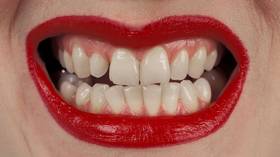Crowning achievement: Scientists may have unlocked secret to regrowing lost teeth

UK molecular biologists claim to have pinpointed the gene responsible for tooth regeneration in mice, paving the way for immense breakthroughs in the field of human regenerative medicine.
The team of researchers, led by Dr Bing Hu from the University of Plymouth’s Peninsula Dental School, studied the genes and signaling molecules responsible for the regeneration of teeth in mice and think they may have cracked how to regrow teeth entirely in the “natural way.”
Teeth are comprised of dead enamel combined with living parts like dentin, pulp, and nerve tissue.
Stem cells can be developed into specialized regenerative cell types, including teeth cells, and the team believe they have pinpointed a specific gene, called DLK1, which enhances stem cell activation and tissue regeneration.
These particular cells contribute to the formation of tooth dentin which makes up the majority of a tooth’s body.
Also on rt.com Scientists grow first ever HUMAN-MONKEY embryo in ‘promising’ step for organ harvestingSuccess in animals doesn’t necessarily mean we’ll be regrowing damaged teeth any time soon, as the regulatory approval process could take years, but it is a highly-promising development in the field of regenerative medicine, says Dr Hu.
“So far, these are all laboratory experiments, and we will have to do a lot of work before we can apply similar methods to treat a person. On the other hand, we can already say that this is a big breakthrough in regenerative medicine, which will radically change the life of patients in the near future the future,” Hu added.
When fully developed and realized, such stem cell treatments could one day provide a novel solution to tooth repair, trauma treatment, and tackling tooth decay.
Like this story? Share it with a friend!














